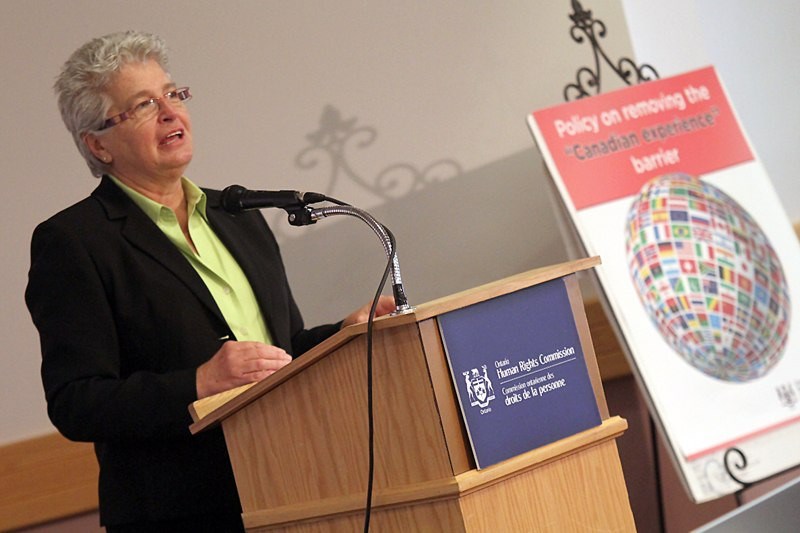The Canadian experience shouldn’t be a prerequisite to immigrants landing jobs in this country, says the chair of the Ontario Human Rights Commission.
Barbara Hall on Thursday said with aging populations, shrinking birthrates and a shortage of skilled labour, Canada is relying more and more on newcomers to Canada to fill employment gaps.
Yet immigrants often face both high rates of underemployment and unemployment.
Often potential employers fail to recognize foreign credentials and experience. Other barriers include language and communication difficulties, employers not helping integrate newcomers into the workplace or being rejected because they’re considered overqualified for the work at hand.
Hall said the Ontario Human Rights Commission’s policy on removing the Canadian experience barrier is an important step in assuring equal opportunity for all.
“People come here often because of their experience and their skill sets,” Hall said, introducing the policy to Thunder Bay government and business leaders.
“The reason they get through the immigration process is because they’re skilled people. And they arrive in Canada and often they’re put in a Catch-22 situation. They go to apply for jobs and they’re asked for Canadian experience, which clearly they don’t have.”
Hall said it’s an impossible situation. What they’re saying is it shouldn’t matter where someone got their experience.
“The question is do you have the skills and the competencies to do the job? What we’re saying to employers is you need to describe what are the skills, what is the competency you need in the job and then find ways to assist people in establishing they have that,” Hall said.
“We think that’s a win situation for everyone. For employers it increases the size of the pool to hire from. And it means more employers will have employees that reflect the customers and contacts in the rest of the world. Clearly for the individuals and their families it means they can work in their area of expertise and settle into the country.”
The policy is the OHRC’s interpretation of the human rights code, which says employers can’t discriminate of the basis of a number of things, including ethnic and religious background.
Hall by putting a policy in place, if employers breach it, employees would then have a mechanism in place to file a complaint at the human rights tribunal.
“But more importantly than that, what we want to do is educate employers about the benefits of getting rid of that rigid requirement and going to what are the skills we need and finding new ways of helping people establish that they have those skills.”
Cathy Woodbeck heads the Thunder Bay Multicultural Association and said her group welcomes any policy that better connects immigrants to employers in the city.
“We think that getting the information out there, educating employers and HR professionals, just assisting newcomers in finding positions (is great),” Woodbeck said.
Luckily it’s not a huge issue in Thunder Bay.
“We haven’t heard a lot of cases. We haven’t heard a lot of that,” Woodbeck said. “We’ve got a lot of employers that are looking for trained professionals and we’ve connected a lot, both through the (immigration) portal and our multicultural programs.”
Coun. Rebecca Johnson said it’s important that Thunder Bay reflect the diversity of the world around it, both in the workforce and at the government level.
“Removing barriers is so important to support newcomers to Canada. It’s not just the right thing to do, it’s good business for organizations.”
The full policy is available at www.ohrc.on.ca.
